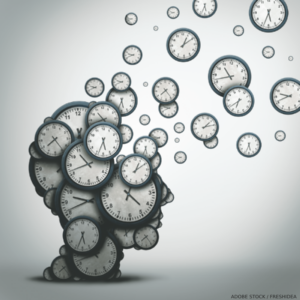 There’s a Word file—somewhere—on one of the many flash drives jumbled in a drawer in my home office. That file is named something like “Overcoming_Procrastination_Column.docx” and was last accessed in the year 2018. I know I wrote about 500 words, and then, one day, I said I would finish it later. But I never did. Over the years, I’ve tried searching in vain for this file, knowing it was a good, heartfelt piece, but now I am resigned to the reality that it’s lost to time. That’s why I’m writing this column—and if you are seeing it in print, it means I have finally learned my lesson and actually overcome procrastination. How did I do that, exactly? Let’s rheuminate!
There’s a Word file—somewhere—on one of the many flash drives jumbled in a drawer in my home office. That file is named something like “Overcoming_Procrastination_Column.docx” and was last accessed in the year 2018. I know I wrote about 500 words, and then, one day, I said I would finish it later. But I never did. Over the years, I’ve tried searching in vain for this file, knowing it was a good, heartfelt piece, but now I am resigned to the reality that it’s lost to time. That’s why I’m writing this column—and if you are seeing it in print, it means I have finally learned my lesson and actually overcome procrastination. How did I do that, exactly? Let’s rheuminate!
A Brief History of Procrastination
Before talking about procrastination, let’s not delay in at least first defining what procrastination is. Not surprisingly, the word comes from Latin, with the roots pro (i.e., forward) and crastinus (i.e., until the next day).1 Procrastination seems like a really appropriate term because mostly it isn’t necessarily to indefinitely postpone but rather to move it to a definite tomorrow, which may never really arrive. It also shows how ancient this concept is. If even the Romans had a word for procrastination, you can imagine how ingrained procrastination must be.
In fact, the earliest advice for not engaging in procrastination comes from the Greek poet Hesiod in around 800 BCE, who talked about not “putting work off until tomorrow or the day after.”2 From that time to now, procrastination seems to have become deeply ingrained and highly prevalent.
In a 2004 study of university students, over 70% self-identified as procrastinators.3 And those are only the ones who self-identified. I am sure many others are secret procrastinators and even more who decided to do the survey later—until the survey closed.
In the field of rheumatology, no studies appear to have been conducted on our procrastination habits, but I bet you the practice is just as widespread.
The Roots
If it looks like procrastination is so hurtful, why in the world is it that we engage in such a terrible habit? At least for me, a large part of what drives my procrastination is perfectionism. It really shouldn’t be surprising to anyone that an editor is a perfectionist. Editors and writers are tasked with looking at each detail and scrutinizing whether a word, or even a letter or space, is appropriate or not. Perfectionist tendencies can come in handy in situations like that, but in the real world—when there is no such thing as perfection yet we seek it constantly—you can understand where that primal dread of getting things done imperfectly can come from.
In the case of my unfinished column, perhaps the fear I had that it was not good enough or that I would be judged as lazy by publishing it that led to the procrastination.
Yet it isn’t only perfectionism that drives procrastination. There is a sort of thrill that comes with having a deadline and doing things at the last minute. In a world that seems a little boring at times, isn’t it nice to have a little bit of adrenaline pumping? For people like me who love challenges, reducing the amount of time to get things done is an appealing way to turn a ho-hum task into something that gives me a sense of purpose.
And then, there’s another reason for procrastination: I am overloaded with tasks and my bandwidth has been exceeded. There are few people I know who would agree with the statement that they are on top of things. Most of us feel perpetually behind and trying to do any number of disparate tasks at the same time. Procrastination, in that sense, is very much a mechanism to defend us from short-circuiting our brains from thinking about everything at all times. Those of us in academic rheumatology are particularly prone to this rationalization for procrastination because we are expected to do many things, like generate revenue, teach learners and publish research at the same time.
Perversely, procrastination is also a form of hope. Procrastination is often a way to escape the unpleasantness of a looming task. For example, when I have to call a patient with whom I do not (yet) have a strong relationship, I fear what they will think of me. While I would love to be able to dive apathetically and immediately into the call, I know I have to prepare myself, occasionally by pursuing more enjoyable tasks before coming to the reality that a difficult conversation is inevitable.
Taming Procrastination
With so much self-reflection on my bad habit of procrastination, I have sought for decades to reduce procrastination. However, no matter how hard I try, procrastination always creeps back in my life. More recently, I’ve realized that I need to adopt a better approach. Instead of trying to eliminate procrastination altogether, I’m working on taming it and managing it in a way that leads to enhanced productivity.
As I was procrastinating one night a few months ago, I learned about a fascinating psychological phenomenon called the Zeigarnik effect.4 The Zeigarnik effect refers to the tendency of people to remember unfinished or interrupted tasks better than tasks that they have completed. When I continued to research this phenomenon, as well as the related Ovsiankina effect (i.e., the innate human urge to finish tasks), I recognized that this was the path forward.5 Although horribly maligned, when applied mindfully, procrastination can be a great tool to advance productivity.
For example, when I am writing one of these columns, I make sure to take a copious number of breaks and switch to doing other types of work frequently. These breaks are a form of structured procrastination so I can fragment a seemingly impossible task into smaller objectives that are more manageable. Using these two effects, I deliberately keep multiple tasks unfinished so I feel motivated to complete them.
Another way I’ve employed the Zeigarnik and Ovsiankina effects is to flip procrastination on its head. Instead of thinking of procrastinating as a way to avoid tasks, I think about how I can savor the joy of breaks. In fact, this whole approach has made me think a lot about my work-life balance. Instead of spending eight hours in the hospital and clinic per day, maybe I should instead think of it as spending eight hours suspending my home life in anticipation for going home and learning all the wonderful things my family members are doing.
Altogether, I’ve started to see procrastination as less of an unhealthy habit than as a vital gift. I procrastinate because I enjoy the present and I find satisfaction in what I am doing right now. When I feel the temptation to procrastinate, I remind myself that this desire comes not from my brain dreading the future but rather because it is in love with the present. By extension, this means that I get to choose what I want to procrastinate on. After all, if my brain tells me that I have to procrastinate to enjoy the present, I should do something truly enjoyable so I can make the most of that gift.
Self-Compassion as Anti-Procrastination
There’s something else that helps with procrastination: self-compassion.6 If perfectionism is a root cause of procrastination, then only self-compassion is the way to address this. You may find better clinicians and writers out there in the world, but you will never find another one better at being me than me. It may sound hokey, but self-compassion is the exercise of kindness so that we can move forward and no longer be trapped in the fear of completing a task.
Self-compassion is also important because it is a social contagion.7 We want to be around people who make us feel like we are in a kind, positive and mindful environment. When we exhibit self-compassion, we attract people in our lives who add to this energy. With such positive relationships, tasks become less heavy and the need to delay something that is dreaded or the fear of being judged becomes less. Procrastination simply becomes a moot point.
Another form of self-compassion can counter the tendency to procrastinate, but it is a little strange to call it self-compassion. That is the compassion and empathy for our future selves as distinct individuals untethered to who we are today. The future Bharat Kumar is dependent on the current, present Bharat Kumar. I should treat him with kindness and give him every tool so he can succeed in the future. In exchange, I would expect nothing less than for my future self to be forgiving and appreciative of whatever things my present self is doing.
The Future of Procrastination
Now that we’ve traced the history of procrastination from ancient Greece and Rome to the modern day, you may wonder what the future of procrastination will look like. There’s no doubt whatsoever that the temptation to procrastinate will remain very much a core part of the human experience and that there are going to be all sorts of new methods to gratify that tendency. Big tech companies have used the Zeigarnik and Ovsianik effects to great effect, essentially addicting us to experiences they charge for.8 At the same time, the duties of a rheumatologist continue to grow, and the pressure to be as perfect as possible can zap the pleasure out of our jobs and lead us down the path of unproductive escapist procrastination.
But there is considerable hope as well. Over the past few months, I’ve utilized an app on my phone that employs the Pomodoro technique.9 My phone creates the structure of four sessions of work, each lasting 25 minutes, with five-minute breaks in between. It essentially blocks my ability to engage in any other activities using the phone. When there are important jobs I must do that cannot be avoided, it curtails my ability to get distracted and the temptation to procrastinate to begin with.
Artificial intelligence (AI) is another field that can help us overcome procrastination.10 Programs and apps that thoughtfully utilize AI can boost productivity, hence making tasks more efficient and less burdensome. AI can also infuse creativity into tasks that are otherwise boring, potentially replacing the adrenaline hit of doing something at the last minute. More insidiously, AI can monitor the degree of our productivity and provide insights into when it is best to continue working and when it may be best to take extended breaks. Finally, AI is inherently manipulative and, if programmed responsibility, AI can manipulate our emotions to feel more engaged and motivated when doing tasks.
Even with these fascinating applications of technology, I think the future of procrastination lies in advances regarding our understanding of the human experience. I envision a larger societal trend in which procrastination becomes less of a stigmatized habit and more of a response to the world around us. In the future, we will consider procrastination as a way to savor our time rather than wasting it away. Time is, after all, our greatest personal asset. We have to ensure that every moment counts and resist its commoditization by the socioeconomic systems we live in.
There’s one last wrinkle I want to mention as I finish this rheumination. I confess that I was supposed to write five clinic notes today. Instead, I finally finished this column. That, my friends, is the real secret of how I overcame procrastination—I just procrastinated something else.
 Bharat Kumar, MD, MME, FACP, FAAAAI, RhMSUS, is the director of the rheumatology fellowship training program at the University of Iowa, Iowa City, and the physician editor of The Rheumatologist. Follow him on X (formerly Twitter) @BharatKumarMD.
Bharat Kumar, MD, MME, FACP, FAAAAI, RhMSUS, is the director of the rheumatology fellowship training program at the University of Iowa, Iowa City, and the physician editor of The Rheumatologist. Follow him on X (formerly Twitter) @BharatKumarMD.
References
- Procrastinate: Definition & meaning. Merriam-Webster. https://www.merriamwebster.com/dictionary/procrastinate.
- Jaffe E. Why wait? The science behind procrastination. Observer. 2013 Apr;26(4). https://www.psychologicalscience.org/observer/why-wait-the-science-behind-procrastination.
- Klingsieck KB. Procrastination: When good things don’t come to those who wait. European Psychologist. 2013;18(1):24–34.
- Naviaux A-F, Janne P, Gourdin M. Do physicians suffer or benefit from the Zeigarnik effect? Encephale. 2021 Dec;47(6):616–617.
- Weigelt O, Syrek CJ. Ovsiankina’s great relief: How supplemental work during the weekend may contribute to recovery in the face of unfinished tasks. Int J Environ Res Public Health. 2017;14(12):1606.
- Rehman S, Rehman E, Liu B. Potential correlation between self-compassion and bedtime procrastination: The mediating role of emotion regulation. Psychol Res Behav Manag. 2023 Nov 22;16:4709–4723.
- Heyes C. Empathy is not in our genes. Neurosci Biobehav Rev. 2018 Dec; 95:499–507.
- Montag C, Lachmann B, Herrlich M, Zweig K. Addictive features of social media/messenger platforms and Freemium games against the background of psychological and economic theories. Int J Environ Res Public Health. 2019;16(14):2612.
- Biwer F, Wiradhany W, Oude Egbrink MGA, de Bruin ABH. Understanding effort regulation: Comparing ‘Pomodoro’ breaks and self-regulated breaks. Br J Educ Psychol. 2023 Aug;93 Suppl 2:353–367.
- Dreamhunter J. 9 ways AI can help you fight procrastination. Juliety. 2024 Apr 1.


